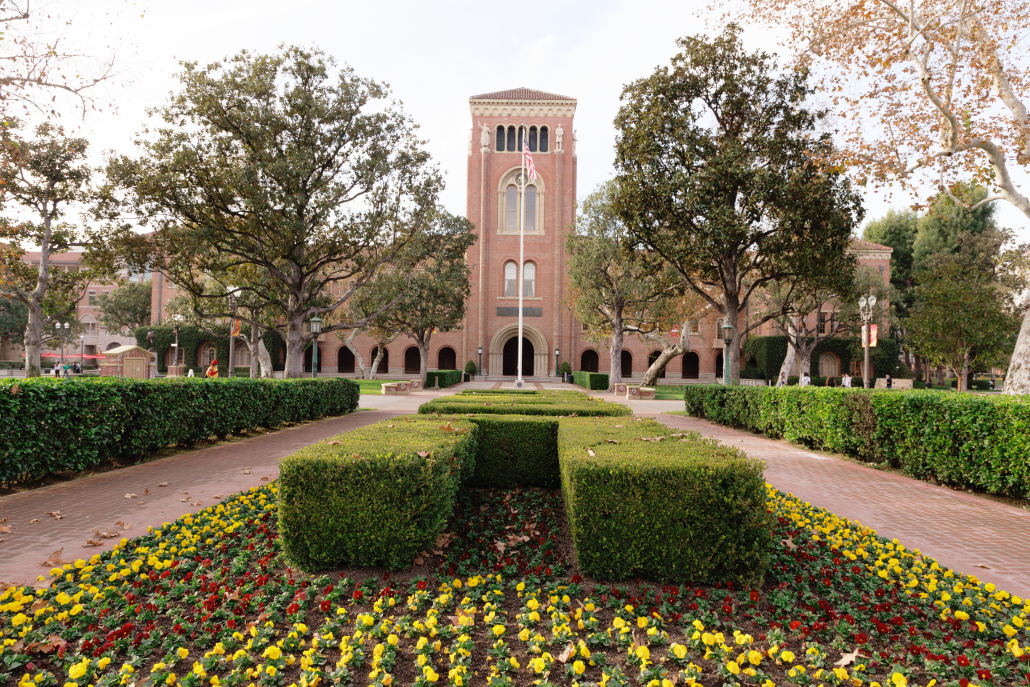USC announces sustainability goals

In stride with Earth Week, the Office of Sustainability announced Assignment: Earth on Monday as its environmental framework for 2028 and beyond.
Assignment: Earth encompasses all of the sustainability initiatives USC hopes to roll out in the upcoming years. The University hopes to accomplish the majority of its goals in time for the 2028 Olympics, which will be hosted in Los Angeles. Multiple sporting events are to be hosted at USC facilities, with members of the media staying in USC Village throughout the event, giving USC a spot on the international stage.
“We want to present USC as a viable model of sustainability,” said Dan Mazmanian, chair of the President’s Working Group on Sustainability in Education, Research and Operations. “What if we said we’re going to roll out our plan in 2029? We will have missed that publicity, the importance of saying something at the Olympics.”

When President Carol Folt arrived at USC in 2019, her administration named sustainability as one of its pillars.
“[Folt is] a biologist and an ecologist, so she understands the importance of all of this stuff and she understands how it works,” said Chief Sustainability Officer Mick Dalrymple.
Two core tenants of USC’s plan are achieving carbon neutrality by 2025 and zero waste by 2028. Eliminating plastic bottles, which was announced Monday as part of Assignment: Earth, is one step in this plan. Beginning July 1, plastic bottles will be phased out from campus retail locations, dining halls, the L.A. Memorial Coliseum, the Galen Center and the USC Hotel. The bottles will be replaced with glass and aluminum alternatives.
The University is able to eliminate plastic bottles because of their renegotiated contract with Coca-Cola. Other single-use plastics, such as cups, may come from different suppliers and will not be affected by the changes.
Retailers in the Village currently do not have to participate in the University’s initiative to cut back on single-use plastics, but Dalrymple is hopeful they will.
“The USC Real Estate Office is trying to work with them using goodwill to ask them to come on board as well and join us in this endeavor,” Dalrymple said.
According to Dalrymple, several stores have already independently started to transition away from plastic bottles, but the big challenge will be changing Target and Trader Joe’s.
“The way that we’re approaching it is asking Target and Trader Joe’s if they have any corporate initiatives that help support what we’re trying to do so, we can kind of work together to bring in substitutes,” Dalrymple said.
While eliminating plastic bottles is the latest announced initiative, Dalrymple said the Office of Sustainability has a lot more in the works.
Along with taking steps towards zero waste, USC’s sustainability community is tackling Scope 1 and Scope 2 emissions — emissions that can be controlled by the University. This includes changes such as switching to LED lighting and putting solar panels on buildings.
To combat the ongoing drought, landscaping with high water usage will be replanted with drought resistant or native plants, and sinks and faucets will have water efficient retrofits.
The Office of Sustainability is not only looking to change USC’s operations to make them more eco-friendly, but also to change the community’s thinking around sustainability.
USC looks to “infuse sustainability into everybody’s courses,” Dalrymple said.
Rather than creating a school of sustainability, the Office of Sustainability hopes to add “sustainability themes and thinking” and experimental learning to general education courses. Additionally, 10 new courses on sustainability will be created every year.
Another facet of USC’s fight against climate change is divesting from fossil fuels. The University announced in February 2021 that it would halt all new fossil fuel investments and divest its $277 million into standing investments, spurred by the student group DivestSC.
In a February press release, the University said it had not invested in fossil fuels since 2018, but the liquidation process would take several years because the investments were “primarily in long-dated private partnerships” and “illiquid in nature.”
“Our office has been making steady progress in shifting investments into sustainable assets, such as renewable energy, carbon mitigation, and land and water conservation,” said Chief Investment Officer Amy Diamond in a statement to the Daily Trojan. “These investments now outweigh the endowment’s historic fossil fuel exposure.”
An integral part of USC’s sustainability push is the Presidential Working Group on Sustainability. Folt created the group upon her arrival at USC in September 2019 to advise her administration on new sustainability initiatives.
The PWG consists of more than 100 students, faculty and administrators. While the PWG can only recommend new policy rather than implement it, the group has assisted with the ideas of Assignment: Earth.
“There does seem to be the idea that maybe that maybe the University isn’t doing all it should,” said Sean McCalla, a member of the student committee on the PWG. “Just be mindful that the work is being done.”
Earth Week at USC brings a number of ways for students to celebrate the Earth and get involved with sustainability at USC.
“I hope students are able to enjoy and celebrate some of the good things, and then also learn more about Assignment: Earth and and get engaged with it and get involved, so that we can all propel USC to the top in terms of setting the example for how to run a sustainable university,” Dalrymple said.

